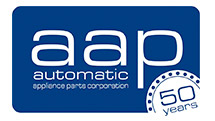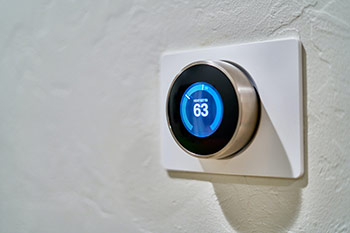What Can Go Wrong With an Air Conditioner?
You Are Here: Home > Automatic Appliance Parts Blog > What Can Go Wrong With an Air Conditioner?
*** Please be aware that Norridge is the only shipping facility. Inventory on-hand at all other branches is unavailable for immediate shipment. ***
Your air conditioner is a complex system with several critical components that must work together to keep your home comfortable. Understanding some of the elements that can go wrong with your air conditioner will help you identify problems early so you can schedule a prompt repair before the issue worsens.
Sensor Issues
Behind the control panel, your air conditioner has a thermostat sensor that tells it how hot or cold the room is. This is a crucial component because the temperature in your home indicates whether the air conditioner should turn on or off. You may have a problem with the sensor if:
- The air conditioner cycles on and off too frequently.
- The air conditioner turns off while the home is still warm.
- The air conditioner is running though the home is too cold.
Turn to your appliance's manual to locate the sensor and see if it's damaged or unattached so you can repair the issue and get your home back to your desired temperature quickly.
Clogged Air Filter
The air filter in your air conditioning system is responsible for removing dust, dirt, dander, pollen, and other irritants from the air as it enters your HVAC system. You should change this filter at least once every three months to keep your air clean. In some homes, you may need to change the filter as often as once a month. A clogged air filter can cause:
- Reduced airflow.
- Higher energy bills.
- Frozen evaporator coils.
- Poor indoor air quality.
Give your filter a visual inspection at least once a month, and change it any time it's visibly dirty.
Dirty Coils
The condenser coils located in your air conditioner's outdoor unit release heat so the refrigerant can cool down before returning to your home. If the coils are covered in grime and dust, heat can't escape properly. This puts added strain on your air conditioning system and may eventually lead to an overheated compressor, at which point the air conditioner will stop working entirely. Some early signs of dirty coils include high energy bills and warm temperatures in your home.
Annual maintenance will prevent this issue. If your home isn't cooling properly and you're overdue for a tuneup, schedule one as soon as possible.
Low Refrigerant
Proper refrigerant levels are essential for a cool and comfortable home. Your air conditioning system doesn't use up refrigerant, so low levels indicate a bigger problem. You need to contact a professional to identify where the refrigerant is leaking and fix this issue at the source before recharging the refrigerant. Some key signs of low refrigerant include:
- Ice on the refrigerant lines.
- A hissing or bubbling noise from the air conditioner.
- Warm air from the vents.
Low refrigerant puts extra strain on your compressor and may lead to a system failure. If you suspect this problem, schedule a repair as soon as possible.
Clogged Condensate Drain
As heat leaves the air in your home, moisture naturally accumulates. The condensate drain in your air conditioner is designed to deal with this. When things are working properly, that moisture drips into the drain pan and neatly exits the unit through the drain line. Unfortunately, the drain line has a tendency to get clogged. If water isn't draining properly, the pan will fill and the water may spill out, damaging your air conditioning system, ceilings, and walls.
Water, moisture, or a musty odor in the home can all indicate a problem with the condensate drain. This is a fairly quick and simple service call, but it's definitely something you want to address quickly before you're dealing with mold or mildew from the extra moisture in your home.
Electrical Control Failure
Your air conditioner has numerous electrical connections and controls that must function properly to keep your home cool. During annual maintenance visits, your technician will give ample attention to these parts, making sure the electrical wires are free from corrosion and tightly connected. If your system isn't properly maintained, it may suffer from a loose wire, bad capacitor, dirty fuse, or short in the wiring. You may have an electrical problem if your air conditioner:
- Doesn't turn on.
- Won't turn off.
- Trips the circuit breaker.
Lack of Lubrication
The air fan motor in your air conditioner moves regularly, circulating air through the system. While newer air conditioners don't always need regular lubrication, this is a critical part of air conditioning maintenance for an older installation. You may notice a squealing noise or poor performance when your air conditioner has this problem. Regular tuneups should help you prevent it.
Leaky Ductwork
Over time, the ducts in your home can develop leaks that allow air to escape. In fact, the average home loses 20 to 30% of the air in its ductwork through holes, gaps, and cracks. This translates to a lot of wasted energy and utility bills that are higher than they should be.
Have your ducts inspected regularly to make sure they're in good condition. Regularly sealing and repairing your ductwork will help you keep air loss to a minimum so you can enjoy optimum cooling and lower utility bills.
Improper Sizing
If you're suffering from poor performance and high utility bills that aren't related to an obvious repair need, you may have an air conditioner that's too large or small for your home. If the system is too large, it will cycle frequently and leave the outer reaches of your home uncomfortable. A system that's too small may run continuously but fail to meet your desired temperatures. Upgrading to a properly sized air conditioner will deliver better efficiency and comfort as well as fewer repairs and a longer lifespan.
To keep your home cool and comfortable, it's important to make sure that you have the right air conditioner installed and that this system is properly maintained. If you care for your air conditioner properly, it should last for 15 to 20 years. Always address repair needs promptly so you don't have to deal with downtime. Automatic Appliance Parts Corporation can help you find the components you need for an affordable repair when something's gone wrong.

 Shopping Cart [empty]
Shopping Cart [empty]









